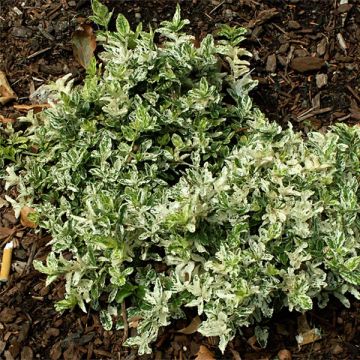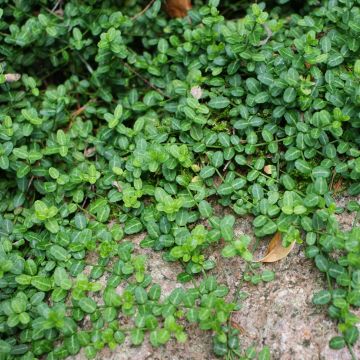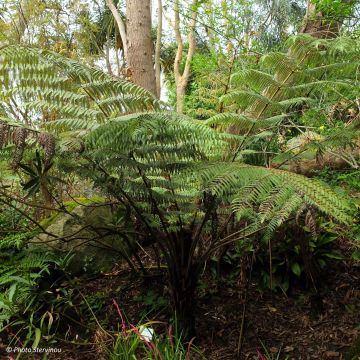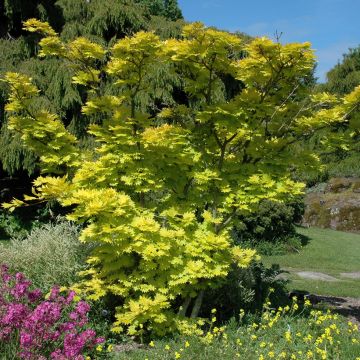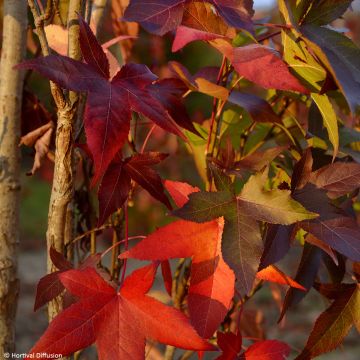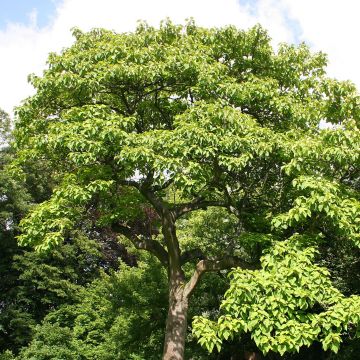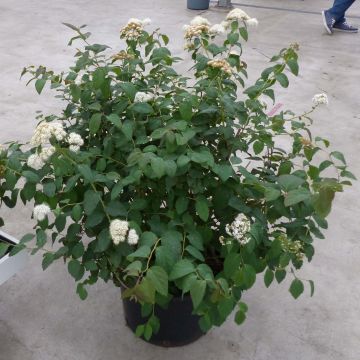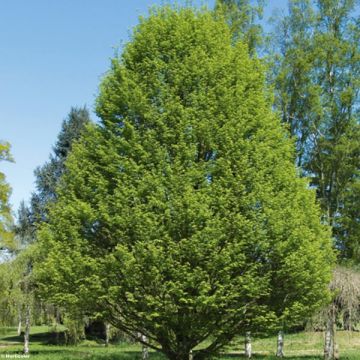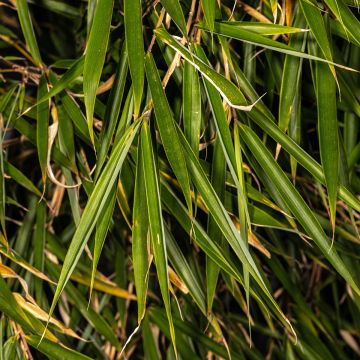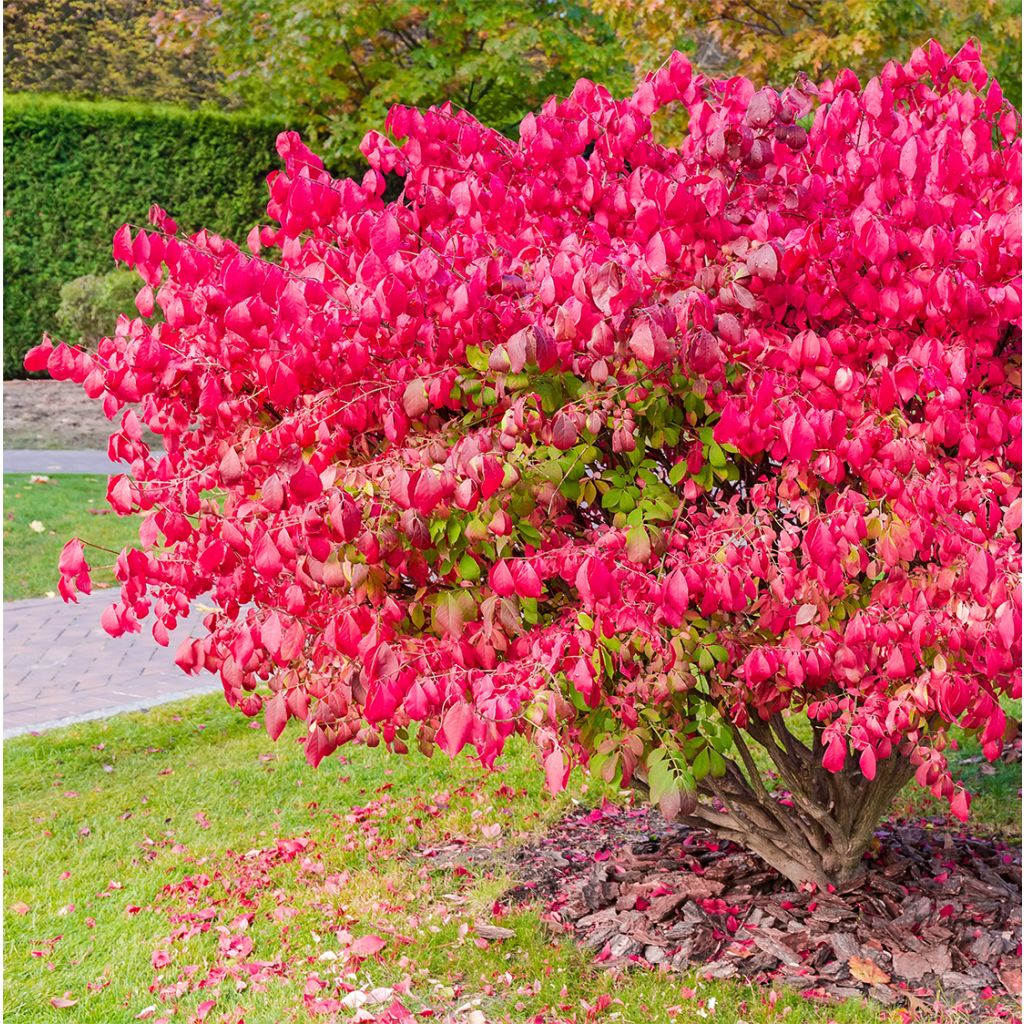

Euonymus alatus Ciliatodentatus - Fusain ailé
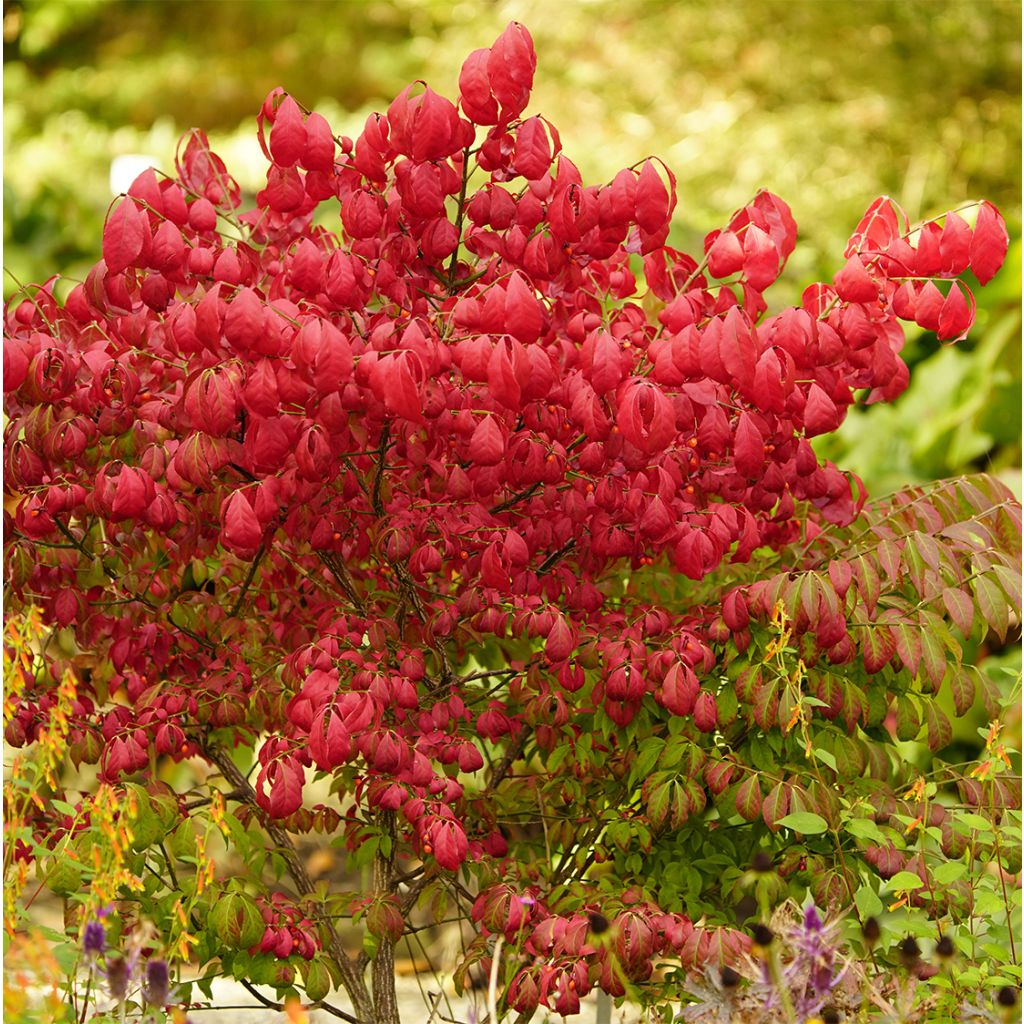

Euonymus alatus Ciliatodentatus - Fusain ailé
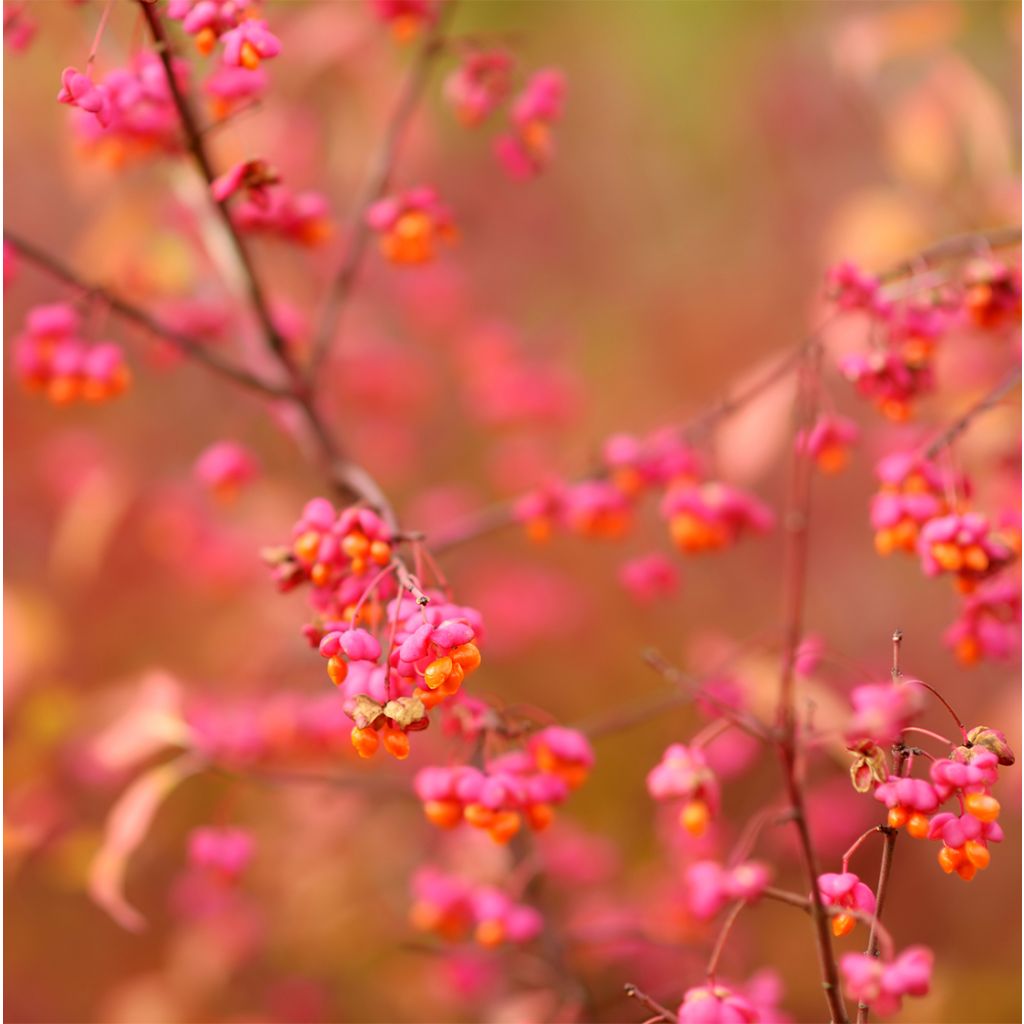

Euonymus alatus Ciliatodentatus - Fusain ailé
Euonymus alatus Ciliatodentatus - Winged Spindle
Euonymus alatus Ciliatodentatus
Burning Bush, Winged Spindle
Received some lovely young plants. I hope they will grow into beautiful ones.
Marie Noelle, 04/11/2022
Special offer!
Receive a €20 voucher for any order over €90 (excluding delivery costs, credit notes, and plastic-free options)!
1- Add your favorite plants to your cart.
2- Once you have reached €90, confirm your order (you can even choose the delivery date!).
3- As soon as your order is shipped, you will receive an email containing your voucher code, valid for 3 months (90 days).
Your voucher is unique and can only be used once, for any order with a minimum value of €20, excluding delivery costs.
Can be combined with other current offers, non-divisible and non-refundable.
Why not try an alternative variety in stock?
View all →This plant carries a 24 months recovery warranty
More information
We guarantee the quality of our plants for a full growing cycle, and will replace at our expense any plant that fails to recover under normal climatic and planting conditions.
Would this plant suit my garden?
Set up your Plantfit profile →
Description
The Euonymus alatus var. ciliatodentatus resembles the compact winged spindle 'Compactus', but this pretty form is perhaps even more compact and beautifully coloured at the end of the season. It is a small and nicely rounded bush with deciduous foliage, initially a fairly ordinary green, but turning to a brighter and more vivid pink and then to deep purple-red by the end of summer before falling off. Its bicoloured orange and deep purple-red fruiting is particularly abundant and decorative against the backdrop of its autumn foliage. It gets its name "winged spindle" from the corky wings that run along its branches. This spindle will adapt to any sufficiently deep and well-drained soil, even limestone and fairly dry in summer.
Originally from Asia, perfectly hardy, the Euonymus alatus var. ciliatodentatus is a dwarf shrub, slow-growing, that does not exceed 1 m (3 ft 4 in) in all directions. Its spherical habit is compact and bushy, supported by branches with 4 prominent and slender corky ridges. The leaves are opposite on the stems, slender, ovate, simple, not exceeding 2 cm (0.8 in) wide by 5 to 6 cm (2 to 2.4 in) long. Their edges are serrated, finely toothed, with fine cilia. They are initially a medium green in spring and summer, then gradually change colour from September onwards, turning pink to dark red. These colours will be more pronounced if the bush is exposed to the sun. The insignificant flowering occurs in May, with very small greenish flowers. In October, it is replaced by very decorative berries, deep purple-red, with a diameter of 1 cm (0.4 in) enclosing a toxic orange seed.
The Euonymus alatus ciliatodentatus is perfect in the foreground of shrub borders, playing with colour and texture contrasts. It will blend well with bronze fennels, dwarf barberries, small conifers, winter heathers or colourful perennials in autumn (asters, yarrows, Japanese anemones...). In small groups, it catches the eye and adds depth to the garden.
Tips: In case of intense drought, water to maintain beautiful foliage.
Report an error about the product description
Euonymus alatus Ciliatodentatus - Winged Spindle in pictures
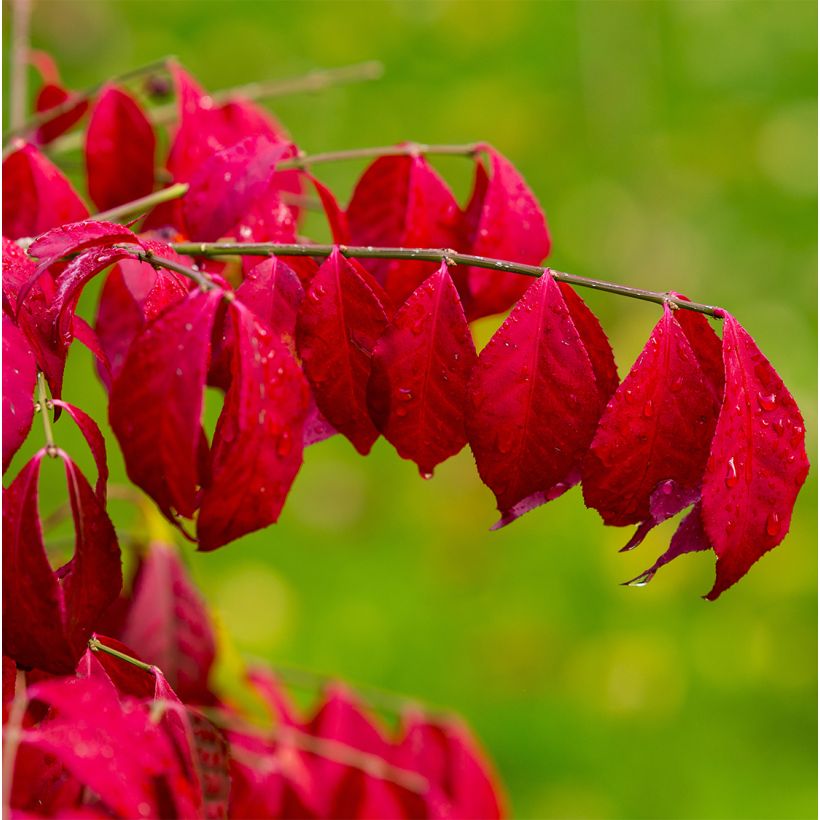



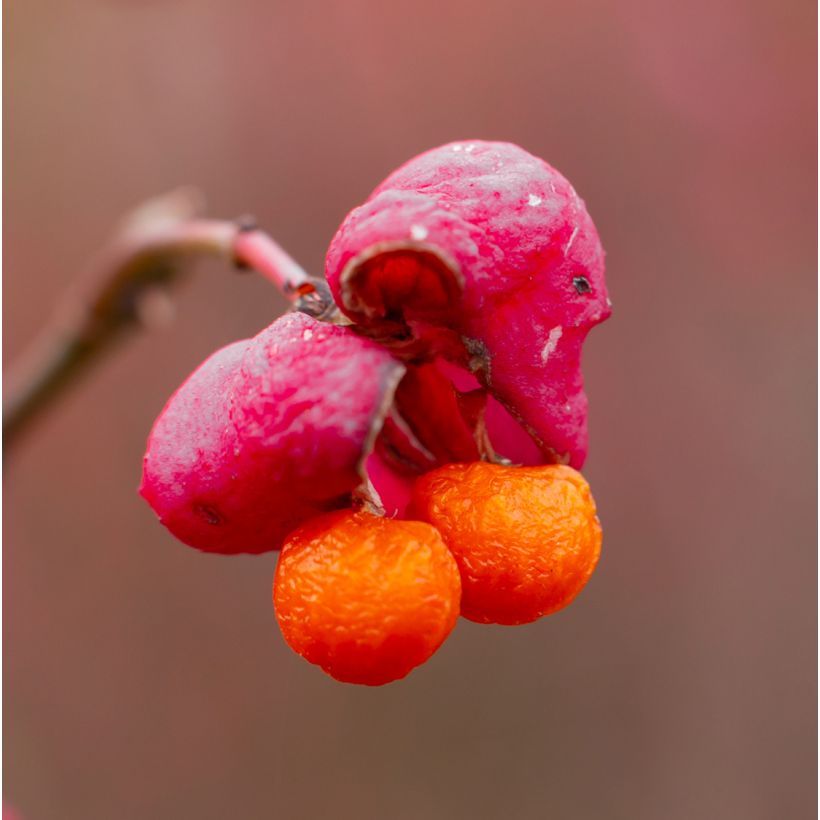

Plant habit
Flowering
Foliage
Botanical data
Euonymus
alatus
Ciliatodentatus
Celastraceae
Burning Bush, Winged Spindle
China
Other Euonymus - Spindle tree
View all →Planting and care
The Euonymus alatus ciliatodentatus is preferably planted in autumn in any well-drained soil in sunny or lightly shaded positions (autumn colours are more intense in the sun). Pruning is unnecessary, it is better to pinch out the young plants to encourage branching and only remove dead or diseased wood. Apply fertiliser twice a year, in early spring and autumn. In case of prolonged drought, water and mulch the base of the bush to maintain beautiful foliage. Plant multiple specimens for better fruiting. Once well established, this small spindle tree can do without watering in summer in all areas if planted in deep soil. Its hardiness is excellent, down to at least -15°C (5 °F).
Planting period
Intended location
Care
-
, onOrder confirmed
Reply from on Promesse de fleurs
Similar products
Haven't found what you were looking for?
Hardiness is the lowest winter temperature a plant can endure without suffering serious damage or even dying. However, hardiness is affected by location (a sheltered area, such as a patio), protection (winter cover) and soil type (hardiness is improved by well-drained soil).

Photo Sharing Terms & Conditions
In order to encourage gardeners to interact and share their experiences, Promesse de fleurs offers various media enabling content to be uploaded onto its Site - in particular via the ‘Photo sharing’ module.
The User agrees to refrain from:
- Posting any content that is illegal, prejudicial, insulting, racist, inciteful to hatred, revisionist, contrary to public decency, that infringes on privacy or on the privacy rights of third parties, in particular the publicity rights of persons and goods, intellectual property rights, or the right to privacy.
- Submitting content on behalf of a third party;
- Impersonate the identity of a third party and/or publish any personal information about a third party;
In general, the User undertakes to refrain from any unethical behaviour.
All Content (in particular text, comments, files, images, photos, videos, creative works, etc.), which may be subject to property or intellectual property rights, image or other private rights, shall remain the property of the User, subject to the limited rights granted by the terms of the licence granted by Promesse de fleurs as stated below. Users are at liberty to publish or not to publish such Content on the Site, notably via the ‘Photo Sharing’ facility, and accept that this Content shall be made public and freely accessible, notably on the Internet.
Users further acknowledge, undertake to have ,and guarantee that they hold all necessary rights and permissions to publish such material on the Site, in particular with regard to the legislation in force pertaining to any privacy, property, intellectual property, image, or contractual rights, or rights of any other nature. By publishing such Content on the Site, Users acknowledge accepting full liability as publishers of the Content within the meaning of the law, and grant Promesse de fleurs, free of charge, an inclusive, worldwide licence for the said Content for the entire duration of its publication, including all reproduction, representation, up/downloading, displaying, performing, transmission, and storage rights.
Users also grant permission for their name to be linked to the Content and accept that this link may not always be made available.
By engaging in posting material, Users consent to their Content becoming automatically accessible on the Internet, in particular on other sites and/or blogs and/or web pages of the Promesse de fleurs site, including in particular social pages and the Promesse de fleurs catalogue.
Users may secure the removal of entrusted content free of charge by issuing a simple request via our contact form.
The flowering period indicated on our website applies to countries and regions located in USDA zone 8 (France, the United Kingdom, Ireland, the Netherlands, etc.)
It will vary according to where you live:
- In zones 9 to 10 (Italy, Spain, Greece, etc.), flowering will occur about 2 to 4 weeks earlier.
- In zones 6 to 7 (Germany, Poland, Slovenia, and lower mountainous regions), flowering will be delayed by 2 to 3 weeks.
- In zone 5 (Central Europe, Scandinavia), blooming will be delayed by 3 to 5 weeks.
In temperate climates, pruning of spring-flowering shrubs (forsythia, spireas, etc.) should be done just after flowering.
Pruning of summer-flowering shrubs (Indian Lilac, Perovskia, etc.) can be done in winter or spring.
In cold regions as well as with frost-sensitive plants, avoid pruning too early when severe frosts may still occur.
The planting period indicated on our website applies to countries and regions located in USDA zone 8 (France, United Kingdom, Ireland, Netherlands).
It will vary according to where you live:
- In Mediterranean zones (Marseille, Madrid, Milan, etc.), autumn and winter are the best planting periods.
- In continental zones (Strasbourg, Munich, Vienna, etc.), delay planting by 2 to 3 weeks in spring and bring it forward by 2 to 4 weeks in autumn.
- In mountainous regions (the Alps, Pyrenees, Carpathians, etc.), it is best to plant in late spring (May-June) or late summer (August-September).
The harvesting period indicated on our website applies to countries and regions in USDA zone 8 (France, England, Ireland, the Netherlands).
In colder areas (Scandinavia, Poland, Austria...) fruit and vegetable harvests are likely to be delayed by 3-4 weeks.
In warmer areas (Italy, Spain, Greece, etc.), harvesting will probably take place earlier, depending on weather conditions.
The sowing periods indicated on our website apply to countries and regions within USDA Zone 8 (France, UK, Ireland, Netherlands).
In colder areas (Scandinavia, Poland, Austria...), delay any outdoor sowing by 3-4 weeks, or sow under glass.
In warmer climes (Italy, Spain, Greece, etc.), bring outdoor sowing forward by a few weeks.


































